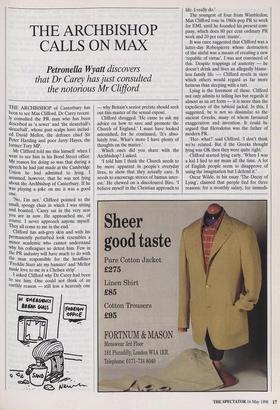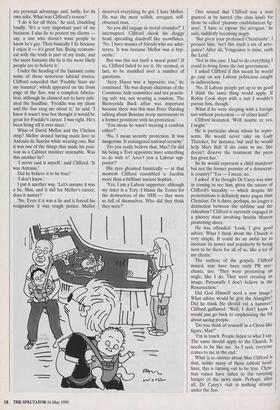THE ARCHBISHOP CALLS ON MAX
Petronella Wyatt discovers
that Dr Carey has just consulted the notorious Mr Clifford
THE ARCHBISHOP of Canterbury has been to see Max Clifford. Dr Carey recent- ly consulted the PR man who has been described as 'a sewer' and 'the sleazeball's sleazeball', whose past scalps have includ- ed David Mellor, the defence chief Sir Peter Harding and poor Jerry Hayes, the former Tory MP.
Mr Clifford told me this himself when I went to see him in his Bond Street office. My reason for doing so was that during a speech he had just made at the Cambridge Union he had admitted to lying. I assumed, however, that he was not lying about the Archbishop of Canterbury. If he was playing a joke on me it was a good one.
`No, I'm not.' Clifford pointed to the small, spongy chair in which I was sitting and boasted, 'Carey sat in the very seat you are in now. He approached me, of course. I never approach anyone myself. They all come to me in the end.'
Clifford has ash-grey skin and with his Permanently perturbed look resembles a minor academic who cannot understand why his colleagues so detest him. Few in the PR industry will have much to do with the man responsible for the headlines Freddie Starr ate my hamster' and 'Mellor made love to me in a Chelsea strip'. I asked Clifford why Dr Carey had been to see him. One could not think of an earthly reason — still less a heavenly one — why Britain's senior prelate should seek out this master of the sexual exposé.
Clifford shrugged. 'He came to ask my advice on how to save and promote the Church of England.' I must have looked astonished, for he continued, 'It's abso- lutely true. What's more I have plenty of thoughts on the matter.'
Which ones did you share with the Archbishop? I asked.
`I told him I think the Church needs to be more apparent in people's everyday lives, to show that they actually care. It needs to encourage stories of human inter- est.' He chewed on a discoloured Biro. 'I believe myself in the Christian approach to life. I really do.'
The youngest of four from Wimbledon, Max Clifford rose in 1960s pop PR to work for EMI, until he founded his present com- pany, which does 80 per cent ordinary PR work and 20 per cent 'stunts'.
It was once suggested that Clifford was a latter-day Robespierre whose destruction of the sinful was a means of creating a new `republic of virtue'. I was not convinced of this. Despite trappings of austerity — he doesn't drink and lives an allegedly blame- less family life — Clifford revels in vices which others would regard as far more heinous than sleeping with a tart.
Lying is the foremost of these. Clifford not only admits to telling lies but regards it almost as an art form — it is more than the expediency of the tabloid jackal. In this, I suggested, he is not so dissimilar to the ancient Greeks, many of whom favoured exaggeration and invention. It could be argued that Herodotus was the father of modern PR.
`Her- what?' said Clifford. 'I don't think we're related. But if the Greeks thought lying was OK then they were quite right.'
Clifford started lying early. 'When I was a kid I lied to my mum all the time. A lot of English people seem to disapprove of using the imagination but I defend it.'
Oscar Wilde, in his essay 'The Decay of Lying', claimed that people lied for three reasons: for a monthly salary, for immedi- ate personal advantage and, lastly, for its own sake. What was Clifford's reason?
`I do it for all three,' he said, chuckling loudly. 'It's a very important part of my business. I also lie to protect my clients say, a star who doesn't want people to know he's gay. Then basically I lie because I enjoy it — it's great fun. Being economi- cal with the truth is part of my trade, and the more fantastic the lie is the more likely people are to believe it.'
Under the heading of the fantastic come some of those notorious tabloid stories. Clifford conceded that 'Freddie Starr ate my hamster', which appeared on the front page of the Sun, was a complete fabrica- tion, although he claimed not to have initi- ated the headline. 'Freddie was my client and the Sun rang me about it,' he said. 'I knew it wasn't true but thought it would be great for Freddie's career. I was right. He's been living off it ever since.'
What of David Mellor and the Chelsea strip? Mellor denied having made love to Antonia de Sancha while wearing one. But it was one of the things that made his posi- tion as a Cabinet minister untenable. Was this another lie?
`I never said it myself,' said Clifford. 'It was Antonia.'
Did he believe it to be true?
`I don't know.'
I put it another way. 'Let's assume it was a lie, Max, and it did for Mellor's career, does it matter?'
`No. Even if it was a lie and it forced his resignation it was rough justice. Mellor deserved everything he got. I hate Mellor. He was the most selfish, arrogant, self- obsessed man. . . . '
`So you did engage in moral crusades?' I interrupted. Clifford shook his shaggy head, spreading dandruff like snowflakes. `No. I have masses of friends who are adul- terers. It was because Mellor was a hyp- ocrite.'
But was this not itself a moral point? If so, Clifford failed to see it. He seemed, in fact, to be muddled over a number of questions.
`Jerry Hayes was a hypocrite too,' he continued. 'He was deputy chairman of the Commons Aids committee and not practis- ing safe sex, not wearing a condom. The Bienvenida Buck affair was important because there was this man Peter Harding talking about Bosnian troop movements to a former prostitute with no protection.'
`You mean he wasn't wearing a condom either?'
`No, I mean security protection. It was dangerous. It endangered national security.'
`Do you really believe that, Max? Or did his being a Tory appointee have something to do with it? Aren't you a Labour sup- porter?'
His eyes gleamed fanatically — at that moment Clifford resembled a Jacobin more than a brilliant ancient Sophist.
`Yes, I am a Labour supporter, although my sister is a Tory. I blame the Tories for the destruction of the NHS — they were so full of themselves. Who did they think they were?' One sensed that Clifford was a man gnawed at by hatred (the class kind) for those he called 'plummy establishment fig- ures'. 'I have to expose the arrogant,' he said, suddenly becoming angry.
`But given your professed Christianity', I pressed him, 'isn't this itself a sin of arro- gance? After all, Vengeance is mine, saith the Lord.'
`Not in this case. I had to do everything I could to bring down the last government.'
I asked Clifford if this meant he would go easy on any Labour politicians caught in indiscretions.
`No. If Labour people get up to no good I think the same thing would apply. If Robin Cook slept with a tart I wouldn't pursue him, though.'
What if he were sleeping with a foreign tart without protection — of either kind?
Clifford hesitated. 'Well, maybe, er, yes, I might.'
He is particular about whom he repre- sents. He would never take on Lady Thatcher, for instance, but said he would help Mary Bell 'if she came to me. She doesn't deserve the treatment the press has given her.'
So he would represent a child murderer but not the former premier of a democrat- ic country? 'Yes — I mean, no.'
I asked if he thought Dr Carey was wise in coming to see him, given the nature of Clifford's morality — which despite his protestations is definitely more pagan than Christian. Or is there, perhaps, no longer a distinction between the sublime and the ridiculous? Clifford is currently engaged in a phoney stunt involving Imelda Marcos promoting shoes.
He was offended. 'Look, I give good advice. What I think about the Church is very simple. It could do an awful lot to increase its power and popularity by being seen to be there for all of us, like a lot of my clients.'
The authors of the gospels, Clifford mused, may have been early PR mer- chants, too. 'They were presenting an angle, like I do. They were creating an image. Personally I don't believe in the Resurrection.'
Did God Himself need a new image? What advice would he give the Almighty? Did he think He should eat a hamster? Clifford guffawed. 'Well, I don't know. 1 would just go back to emphasising the bit about saving people.
`Do you think of yourself as a Christ-like figure, Max?'
`I'm in touch. People listen to what I say. The same should apply to the Church. It needs to be like me. As I said, everyone comes to me in the end.'
What is so sinister about Max Clifford is that, unlike many of those tabloid head- lines, this is turning out to be true. Chris- tian values have fallen to the ravening hunger of the news maw. Perhaps, after all, Dr Carey's visit is nothing strange under the Sun.



























































 Previous page
Previous page